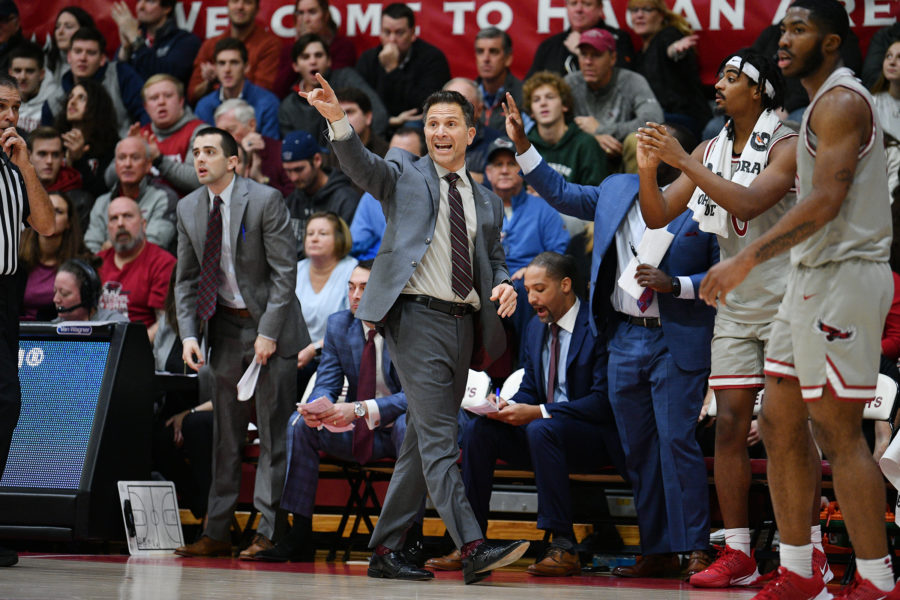
Billy Lange probably saw the news reports that Saint Joseph’s had fired Phil Martelli and would be looking for a new head basketball coach, but it’s unlikely he went too deep into the story. The Sixers, for whom he was then an assistant coach, had just played Milwaukee. That night, the team was in Charlotte, and a game against Boston loomed the following evening. The NBA schedule is unforgiving, and it doesn’t provide much time to pay attention to other things—no matter how seismic they may be in the Philadelphia basketball community.
Lange, who was in his sixth season with the Sixers and could have been Brett Brown’s lieutenant “forever,” didn’t consider himself a candidate for the Hawks’ job until school athletic director Jill Bodensteiner reached out. In fact, Lange thought that if he spent a few more years at Brown’s side, he might just be able to land a top job in the NBA. But once Bodensteiner made the call, things about the job started to make sense.
Like how just about his entire family graduated from St. Joe’s. And how his wife worked there for six years. He had developed good relationships with Martelli and assistants Matt Brady and Monte Ross while he was on the staff at Villanova and La Salle.
“I loved the NBA,” Lange says. “It was an amazing experience, and I would have done it for the rest of my life. But the chance to be the steward of Saint Joseph’s basketball and what that would mean for a guy who grew up in New Jersey following Big Five basketball was a great opportunity.”
Rather than continue at the right hand of Brown and launch a move up the NBA coaching ladder, Lange became a candidate for the job, and fewer than two weeks after Martelli’s departure, the Hawks hired him. He faces the challenge of resuscitating a program that has gone 41-55 over the past three seasons and is trying to cultivate a new identity in a crowded Philadelphia basketball scene and within a mid-major landscape that has provided great opportunity for teams but which has also consigned many to difficult circumstances as they try to escape the morass of the roundball middle.
Lange must rejuvenate the Hawks on and off the court. He must build a roster capable of competing in the Atlantic 10 Conference and beyond while also cultivating alumni, Philly hoops fans and students, most of whom have experienced a waning of their ardor for the program. In many ways, it’s a rebuilding job we have seen many times and often within the Delaware Valley’s confines: New coach comes in with the charge to generate excitement and wins. It’s almost standard issue. But at St. Joe’s, which as an institution is identified heavily with the success of its basketball program and at which new Bodensteiner has been charged with reviving not just one team but a whole department, Lange’s challenge is not just confined to Hagan Arena.
“Number one, I respect the heck out of Coach Martelli,” Lange says. “He is a friend of mine and my family’s, and the job and work he did here is amazing. I never looked at it as replacing him.
“The second thing is what the task at hand is. I am the steward of a program with a great tradition. I need to be the CEO of a program that means a lot to this university.”
When Lange looks at the ceiling for the Hawk program, he goes back over the past decade and sees two national championships from Villanova, two final game appearances by Butler, one by Gonzaga and Loyola-Chicago’s Final Four run in 2018. That’s a lot of success from smaller, private institutions.
“That should give us elevated hope of being there someday,” he says.
No one can question whether Lange has the local profile to run the Hawks. He played at Rowan, coached under Herb Magee at Philadelphia University, Speedy Morris at La Salle and Jay Wright at Villanova—twice. Although his seven-year stint as head coach at Navy (2004-11) produced an uninspiring 93-114 record, he did lead the Mids to 19 victories in ’08-09. Further, while coaching winning football in Annapolis has proven to be possible, that success hasn’t often translated to the hardwood, where it’s harder to win with scheme and precision. Lange would never make excuses for his tenure, but it’s hard to fault him for not winning big at the Academy.
While with the Sixers, Lange survived the lose-at-all-costs “Process” fiasco and developed a reputation as a strong defensive tactician. As the team began to experience more success, Lange became more visible among the NBA community, thus his belief in a potential head coaching job in the future. “I felt very confident that over time there would have been that opportunity,” he says.
When Bodensteiner began collecting candidates for the job, she didn’t just look at basketball. Her charge is more global, and therefore she was in need of someone capable of navigating the modern college athletics landscape.
“We were looking for someone who could think in an innovative manner who understands the current generation and importance of the student-athlete experience,” she says. “We were looking at someone capable of building a culture and less on X number of games someone had coached.”
For her “culture” is defined by a strong sense of accountability that goes beyond just following rules. Bodensteiner wanted a coach capable of creating a team in which the players “care so much about each other they will fight to the end.” She describes her first meeting with Lange as “full of energy”. She and others in the room felt a strong connection with Lange because of his family history and his understanding of Saint Joseph’s tradition and basketball’s strong role at the university.
“Billy is into relationship building and not just recruiting and cranking people through a system,” she says. “He cares about the whole person.”
Lange didn’t get too much time to celebrate his new position. Within several weeks of Martelli’s ouster, three mainstays of the ’18-19 squad, guards Lamarr “Fresh” Kimble and Jared Bynum and forward Charlie Brown, all bolted town, leaving Lange with some big roster holes and not a lot of time to fill them. The Hawks were bolstered by Ryan Daly’s eligibility. Daly, a high-scoring wing who transferred last year from Delaware, provided instant offensive production. Instead of hitting the junior college market or piling up a bunch of transfers who don’t fit his culture, Lange was prudent. He grabbed Dennis Ashley, a transfer from Maine, and a few freshmen, but he looked long term in his roster management, understanding that coaches who try to make big impressions early on can trap themselves later with personnel who don’t fit their cultures.
“Recruiting has to be backed up by fact and honesty and relationships,” Lange says. “You can’t just be a salesman.”
He will attempt to pull from the Philadelphia area, although the change in high school basketball character from public to private schools has brought more interlopers into the area capable of luring away top talent. So, he’ll have to be creative out of town—Lange uses the word “tactical”—to find players willing to join the program and be part of what he hopes will be a renaissance characterized by A-10 contention and a return to the NCAA tournament.
This has been an interesting career turn for Lange, who had built an identity within the NBA and now has committed to campus life. He’ll leverage his ties to and familiarity with St. Joe’s to connect with alumni and fans. He’ll use his energy and charisma to engage the students. And he will work the recruiting trail to find players willing to join a program that represents more than just winning and losing. It’s a good match and a good spot for a coach who is ready to lead.
“I love it,” Lange says. “I’m at a great university. I believe in Saint Joseph’s. I believe in Hawk Hill, the people, the place and the spirit of ‘the hawk will never die.’”

